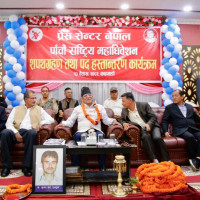- Sunday, 27 April 2025
Achieving E-governance
E-governance has become a new catchword these days as the information revolution has impacted every sphere of society. Digital devices have proved a boon to improving government services to the public and facilitating businesses effectively, efficiently and transparently. The people’s access to information and data of public importance has become easy, enabling them to hold government officials accountable for their responsibilities and actions. Thus, e-governance has played a vital role in enhancing transparency and accountability, which are the keys to curbing corruption and ensuring time-bound services to the citizens.
Taking the benefit from the booming information and communication technology (ICT), Nepal has adopted various policy and legal steps to digitalise its administration and governance system so that people have no difficulty in receiving the facilities from the state. Some important legal instruments include the ICT Policy, 2072, the Government Enterprise Architecture Directives, 2076, the National Cyber Security Policy, 2080 and the Digital Nepal Framework, 2076, which seek an integrated digital ecosystem, guarantee data security and interoperability, among other objectives. However, creating a digital Nepal entails a lot of challenges such as poor infrastructure, a lack of inter-agency coordination and insufficient literacy.
Against this backdrop, the e-Governance Board of Nepal has unveiled a preliminary draft of the 'e-Governance Blueprint' with a focus on 'National Data Strategy' and 'once only principle'. The blueprint primarily aims to plug the gaps that obstruct realising full-fledged governance in the country. The Board has sought suggestions to enrich and make the blueprint inclusive and comprehensive. It has emphasised implementing the 'Once-Only Principle' (OOP), which stipulates that personally identifiable data will not be collected frequently once it has been collected once. The idea of OPP has been brought into use to minimise the administrative burden of people and companies that are impelled to furnish the same personal or private data to multiple government agencies time and again to obtain services from them. This provision also facilitates the inter-agency data exchange and avoids confusion.
One of the important features of the draft is the adoption of a 'National Data Strategy' to make data storage, exchange, management, and use more effective, according to a news report of this daily. Data management and security have been a big challenge for the country after it entered the three layers of government – federal, provincial and local. The three governments still face problems in sharing data and information essential for the smooth service delivery and prudent mobilisation of resources. The proposed strategy is geared towards resolving this problem by improving the quality and interoperability of data through the alignment of data sets across public bodies and streamlining the development of new digital services.
The 'e-Governance Blueprint' has been prepared by taking cues from international legal and policy frameworks such as the Global Digital Compact, GovStack and Digital Public Infrastructure. It is expected to set standards for data cataloging and service indexing, guidelines for digital service delivery and cybersecurity, and key performance indicators (KPIs) for digital governance. In fact, Nepal does not lack digital and cyber laws and policies. What we need is the strong political and administrative will to create necessary digital infrastructures and build institutional capacity crucial for achieving e-governance and economic prosperity.















-original-thumb.jpg)
